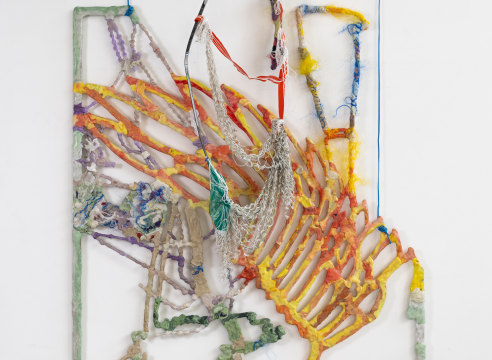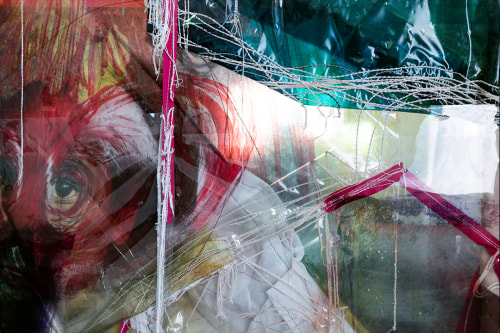

Julien Creuzet is a French-Caribbean artist whose work combines experimental filmmaking, music, sculpture, performance, and poetry. Mixing language, dance, and literature, his output is extensively influenced by the history of decolonization. The title of the exhibition is an extract from a poem Creuzet himself wrote, reflecting on the relationship between peripheries and centers, questioning the idea of time and geographical location as fundamental concepts in understanding cultural production. Reacting against dominant Western narratives, Creuzet looks for inspiration in the legacy of Afro-Caribbean and Creole philosophical thought and literary production.
A key influence in the work of Creuzet is the surrealist author and poet André Breton, a seminal figure who played an important role in the reevaluation of African culture in art history. During the Second World War Breton emigrated from Europe to the United States of America. On his way to New York, he stopped in Martinique. While there, he began exploring the local cultural landscape, which inspired his writing. One of the most significant interlocutors he met in Martinique was poet, playwright, and future politician Aimé Césaire, a highly influential author of the French-speaking Caribbean. Breton’s output, questioning the Western canon and complexifying the dominant Western ideology of the time, alongside Césaire’s writings on Black identity and the concept of Négritude, are pivotal in Creuzet’s work.
Césaire’s thoughts about creating a more positive sense of humanity, through the rediscovery of Black cultural qualities and restoring the cultural history of Black Africans, were represented in his book Cahier d'un retour au pays natal(Return to My Native Land). A mixture of poetry and poetic prose, the book was written on a small island on the Adriatic coast of Croatia. The sky, the sea and landscapes, reminiscent of Césaire’s journey to Croatia, are represented in the screens that illuminate the exhibition space, offering an ever-moving pictorial horizon.
The exhibition confronts the viewer with questions on the animate and the inanimate, linking the enclosed space of the gallery with a larger universe of references. Avatars of dancers performing in different African traditions, including dances from the African diaspora, coupled with enigmatic spoken word poetry and sounds composed by the artist are deliberately unsettling, and echo the ethics of difference, Creolization, and the plurality of thought that is at the core of Creuzet’s practice. The ambiguity of representation, dance as a tool of resistance, and cultural hybridity create what Creuzet describes as a ‘decolonized opera,’, a spectacle of forms, sound and time-based media combined.
Julien Creuzet conceived the exhibition during his artist residency at Luma Arles (France) in 2021 and 2022, where the first presentation of it was on view until recently. In December, he was selected to represent France at the 2024 Venice Art Biennale.